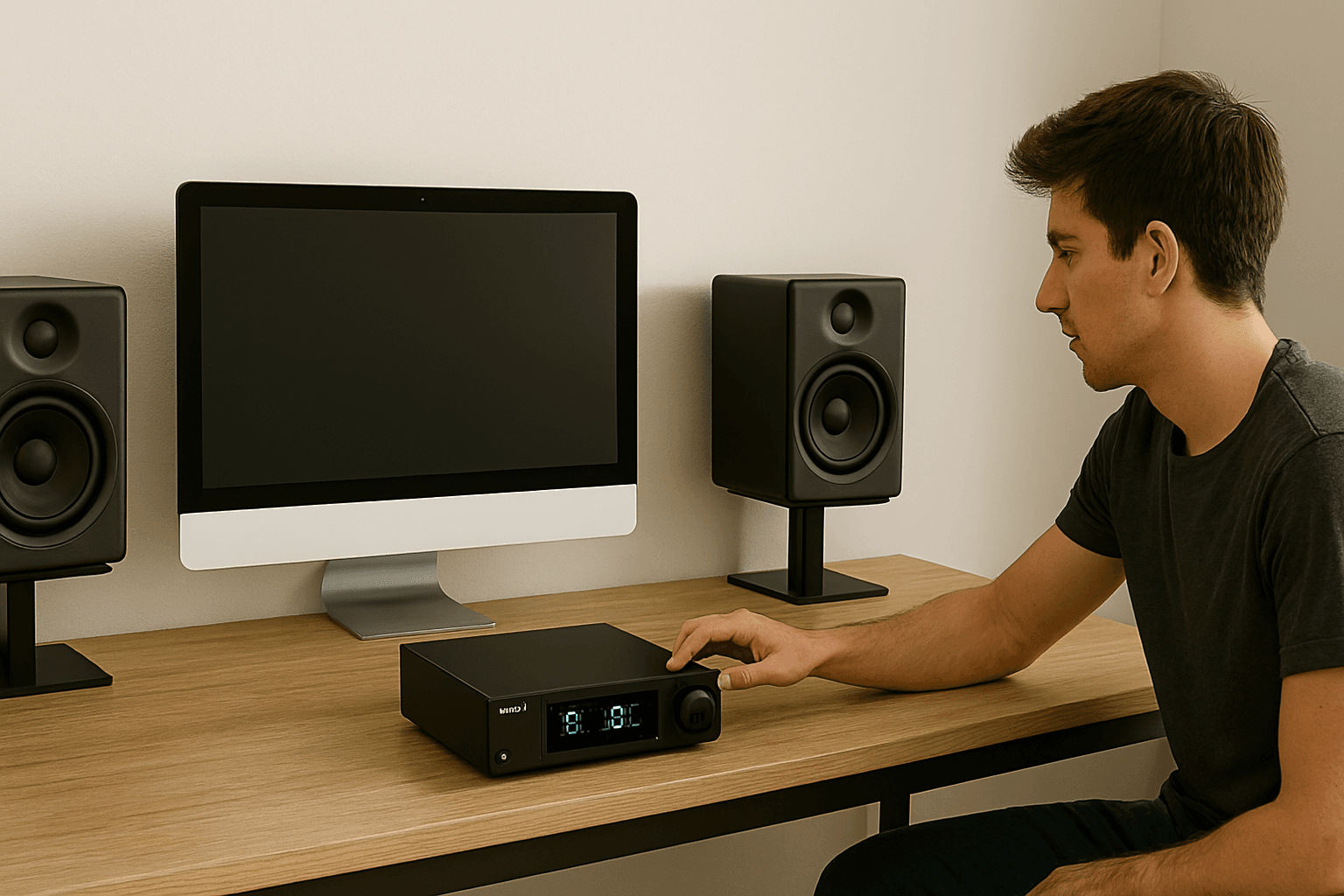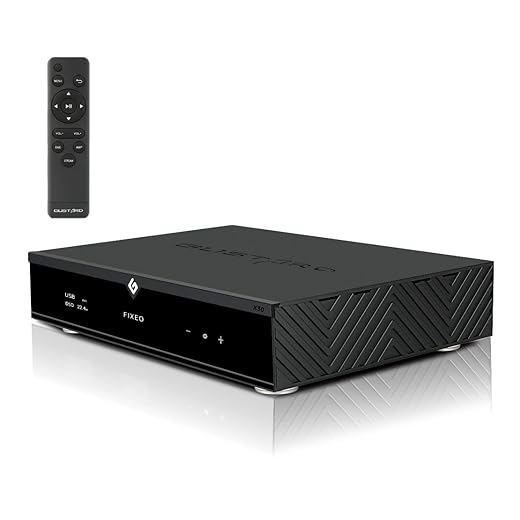If you’ve ever wondered why your music doesn’t sound quite as rich or immersive as it should—especially when streaming from your laptop or phone—you’re not alone. The culprit is often hidden in plain sight: your device’s internal DAC, or Digital-to-Analog Converter. For those just stepping into the world of high-fidelity audio, understanding what a DAC does—and why a model like the Gustard DAC-X30 is worth your attention—can be transformative.
Let’s break it down from the ground up.
🧠 What Is a DAC, and Why Should You Care?
Every digital audio signal—whether it’s a Spotify stream, a YouTube video, or a high-res FLAC file—starts as a series of 1s and 0s. But your ears don’t hear binary. They hear analog sound waves. A DAC is the bridge that converts digital data into analog signals your headphones or speakers can play.
Most devices (phones, laptops, TVs) have built-in DACs, but they’re often basic, designed for convenience rather than quality. That’s where external DACs come in—especially ones like the Gustard DAC-X30, which elevate your listening experience from “pretty good” to “goosebumps.”
🔍 Meet the Gustard DAC-X30: A First Look
The Gustard DAC-X30 is a network streaming DAC designed for serious audio enthusiasts—but it’s also surprisingly welcoming to newcomers. It’s packed with cutting-edge components and versatile connectivity, making it a future-proof investment for anyone building a Hi-Fi setup.
Here’s what makes it special:
- ✅ Four ES9039PRO DAC chips for ultra-precise conversion
- ✅ Supports PCM up to 768kHz and DSD512 for high-resolution audio
- ✅ Multiple input options: USB, LAN, Optical, Coaxial, AES, IIS
- ✅ RCA and XLR outputs for flexible system integration
- ✅ Acts as a preamp and streaming bridge—no need for extra gear
🧬 The Heart of the Beast: ES9039PRO x4
At the core of the DAC-X30 are four ES9039PRO chips—some of the most advanced DAC chips available today. Why four? Because Gustard isn’t just aiming for good sound—they’re chasing perfection.
These chips are known for:
- Low distortion and high dynamic range: You’ll hear more detail, from the subtle breath of a vocalist to the shimmer of cymbals.
- Channel separation: Instruments feel like they occupy distinct spaces, creating a more immersive soundstage.
- Precision filtering: Harshness and digital glare are minimized, making long listening sessions more enjoyable.
For a beginner, this means your music will sound cleaner, fuller, and more emotionally engaging—without needing to understand the technical jargon.
🎶 High-Resolution Audio: What Do PCM768kHz and DSD512 Mean?
These numbers might look intimidating, but they’re simply indicators of how much detail the DAC can handle.
- PCM768kHz: This refers to Pulse Code Modulation, the standard format for most digital audio. 768kHz is far beyond CD quality (44.1kHz), allowing for incredibly nuanced playback.
- DSD512: Direct Stream Digital is another format used in high-end recordings. DSD512 is one of the highest resolutions available, capturing audio with breathtaking realism.
Even if you’re streaming from Tidal or Qobuz, having a DAC that supports these formats ensures you’re getting the best possible sound from your source.
🔌 Inputs and Outputs: A DAC That Plays Well With Everything
One of the most beginner-friendly aspects of the DAC-X30 is its connectivity. Whether you’re plugging in a laptop, a network streamer, or a CD transport, this DAC has you covered.
Inputs:
- USB: Ideal for connecting to computers or streamers.
- LAN: Enables network streaming—perfect for integrating with Roon or DLNA setups.
- Optical & Coaxial: Common on TVs, CD players, and older gear.
- AES & IIS: Professional-grade inputs for advanced setups.
- Clock Inputs: For syncing with external master clocks—useful in studio environments.
Outputs:
- RCA (unbalanced): Standard for most consumer audio gear.
- XLR (balanced): Preferred in high-end setups for noise rejection and better signal integrity.
This flexibility means you won’t outgrow the DAC-X30 anytime soon. It adapts to your system, not the other way around.
🧭 Built-In Streaming and Preamp Functionality
Unlike many DACs that require additional components, the DAC-X30 doubles as a network streamer and preamp. That means:
- You can stream music directly over LAN without needing a separate device.
- You can control volume and source selection from the DAC itself.
- You can connect it directly to powered speakers or a power amp—no need for a separate preamp.
For someone just starting out, this simplifies your setup while still delivering audiophile-grade performance.
🛠️ Build Quality and Design: Understated Elegance
Gustard is known for its meticulous engineering, and the DAC-X30 is no exception. The chassis is solid and vibration-resistant, with a clean front panel that doesn’t overwhelm you with buttons or lights.
Inside, the layout is optimized for signal purity, with separate power supplies for analog and digital sections. This reduces interference and ensures consistent performance.
Even if you’re not a techie, you’ll appreciate the attention to detail. It’s the kind of gear that feels reassuringly well-made—like it’s built to last.
🧘♂️ Why It Matters for Beginners: Emotional Clarity
Here’s the truth: you don’t need golden ears or a $10,000 system to appreciate what a good DAC does. The Gustard DAC-X30 doesn’t just make music sound “better”—it makes it feel more alive.
- Vocals become more intimate.
- Bass gains texture and depth.
- Treble smooths out without losing sparkle.
- The space between instruments becomes more defined.
It’s not about chasing specs—it’s about rediscovering your favorite songs with fresh ears. And for someone new to Hi-Fi, that’s a powerful experience.
🧩 How to Use It: A Simple Starter Setup
Let’s say you’re starting from scratch. Here’s a basic setup using the DAC-X30:
- Source: Your laptop or streamer (via USB or LAN)
- DAC: Gustard DAC-X30
- Amplification: Powered speakers or a stereo amplifier
- Speakers/Headphones: Your choice—just make sure they’re decent
Plug it all in, select your input, and start listening. No complicated software, no endless tweaking. Just pure, high-resolution sound.
💡 Tips for Getting the Most Out of Your DAC-X30
- Use high-quality cables: Especially for USB and XLR connections.
- Try different filters: The DAC-X30 offers selectable digital filters—experiment to find your preferred sound.
- Explore high-res streaming services: Tidal, Qobuz, and Apple Music (lossless) can show off what this DAC can do.
- Keep firmware updated: Gustard occasionally releases updates that improve performance or add features.
🧭 Final Thoughts: A Gateway to Better Listening
The Gustard DAC-X30 isn’t just a piece of gear—it’s an invitation. An invitation to slow down, to listen deeply, and to reconnect with the emotional core of your music. For newcomers, it offers a rare combination of technical excellence and user-friendly design. For seasoned audiophiles, it’s a serious contender in any setup.
If you’ve ever felt overwhelmed by the world of DACs, let this be your starting point. The DAC-X30 doesn’t ask you to be an expert—it simply asks you to listen.
And once you do, you’ll never hear music the same way again.


